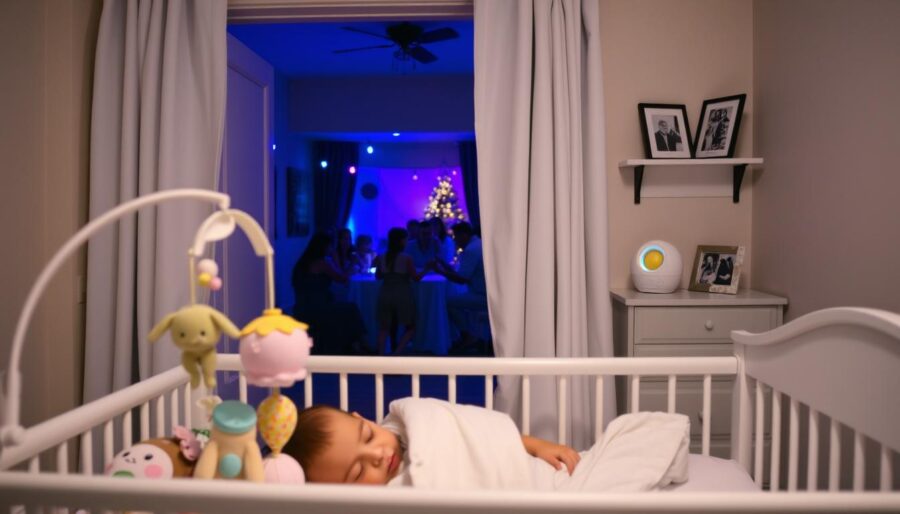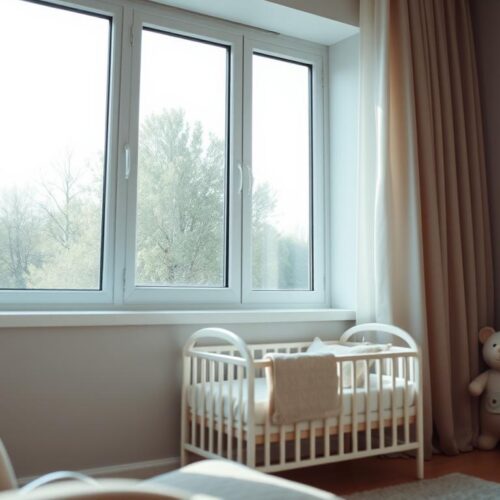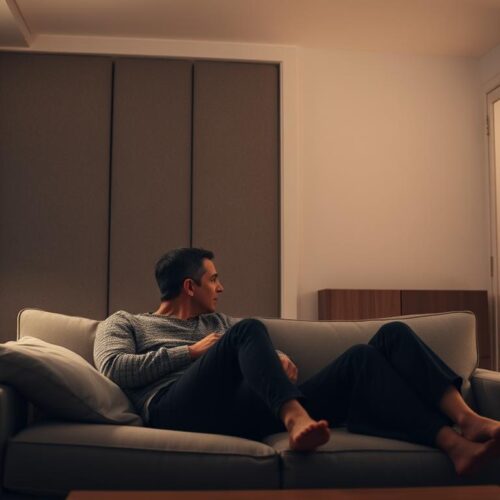Having a baby at home means adjusting how you host gatherings, especially with noise. It’s vital to keep the environment calm for your baby’s well-being. As you plan events, thinking about noise and your child is crucial. This guide will help you manage party noise so your baby stays calm, and everyone has fun.
Understanding Baby Sensitivity to Noise
Babies have a special sensitivity to noise due to their delicate bodies. Knowing why they react strongly in loud places is important for parents. Events with loud sounds, like parties, can be challenging.
A baby’s ear canals are small and make sounds seem louder than they are to adults. Knowing about this sensitivity helps you take care of them better, especially in noisy places.
Why Babies Are More Sensitive to Loud Sounds
Babies have ears that are still growing, which makes loud sounds a big problem. They don’t just hear noise louder; they might find it uncomfortable too. Sounds that are okay for adults can upset a baby.
The Impact of Noise on Infant Development
Loud noise can be bad for a baby’s growth. It might cause hearing loss, making it hard for them to communicate and learn. Too much noise can also make them fussy and mess with their sleep.
By paying attention to how your baby reacts to noise, you can make a safer, happier space for them. This is key for their well-being and growth.
What Is Considered Loud Noise?
Knowing what loud noise is, is key to protecting your baby’s hearing. Studies show that noises should be under 60 decibels for babies. Noises above 80 decibels can harm their hearing, so we need to watch noise levels closely, especially at gatherings.
Decibel Levels and Their Impact on Babies
Decibels tell us how loud a sound is. A whisper is about 30 decibels, talking is 60 decibels. Sounds over 80 decibels, like loud music or shouts, can stress a baby’s ears. We must keep an eye on noise at events to keep babies’ hearing safe.
Common Sources of Loud Noise at Social Events
Loud noises come from many places at parties. You might hear:
- Loud music or sounds from speakers.
- People talking loudly because they’re excited.
- Home appliances like blenders or vacuums.
- Kids playing or shouting loudly.
Being aware of loud noises is important to protect your baby at parties. It’s key to watch out for loud sounds and music to keep them happy and healthy.
Identifying the Effects of Party Noise on Babies
Knowing how loud noises affect your baby is vital. Party noise causes different reactions in infants, physically and emotionally. It’s important to understand these to keep your baby calm and reduce stress.
Signs of Distress in Infants Due to Noise
Loud party noise can upset babies a lot. They show they’re distressed in several ways, such as:
- Irritability and fussiness
- Inconsolable crying
- Physical signs like clenched fists or arching their back
- Turning away from the source of noise
Noticing these signs early helps you make things better for your baby at gatherings.
Impact of Overstimulation on Young Children
When babies are overstimulated, they find it hard to handle their feelings. Effects of too much stimulation include:
- Difficulty falling asleep or staying asleep
- Being more sensitive to touch or sound
- Feeling restless and finding it hard to relax
Loud parties can be too much for your baby. Knowing when they’ve had enough helps you take steps to comfort them.
Party Noise and Babies: Risks and Considerations
When you throw a party, think about how loud sounds affect babies. Noise at parties is more than just annoying. It can risk an infant’s hearing if they hear loud sounds too often. We must protect babies’ ears from harm. Their hearing is still developing, making them more sensitive.
Long-Term Hearing Risks from Exposure to Loud Noise
Studies show that loud noises can hurt young children’s hearing for good. A baby’s ears are very delicate, so they’re more at risk. It’s critical for parents to keep noise down, especially at parties with loud music.
How Party Noise Can Disrupt Baby Sleep Patterns
Infants need a quiet place to sleep. But noise from parties can mess with their sleep. This can make them grumpy and unhealthy. Keeping parties far from where a baby sleeps is smart. This protects their sleep and health. Think about this when you plan to have people over.
How to Reduce Noise at Parties with Babies
When having a party where babies will come, using good strategies can make things quieter. It’s key to tell your guests about this and set up a quiet area for babies. This makes the party better for everyone.
Planning and Communication with Guests
Before your party, talk to your guests about keeping noise low. Tell them you’re aiming for a family-friendly vibe and need their help. Stressing the need to protect infant ears helps everyone get on board.
Sharing tips on how to keep things quieter can set clear expectations. A kind reminder can make the atmosphere nicer for both kids and adults.
Creating a Quiet Space for Babies During Gatherings
Having a special spot for babies at your event can be a game-changer. Set up a calm area with things like soft pillows and gentle decorations. Make sure it’s away from loud noises and has items like warm blankets, dim lights, and white noise machines.
Parents will be thankful for a quiet place for their little ones. This thoughtful touch makes the gathering more enjoyable for all.
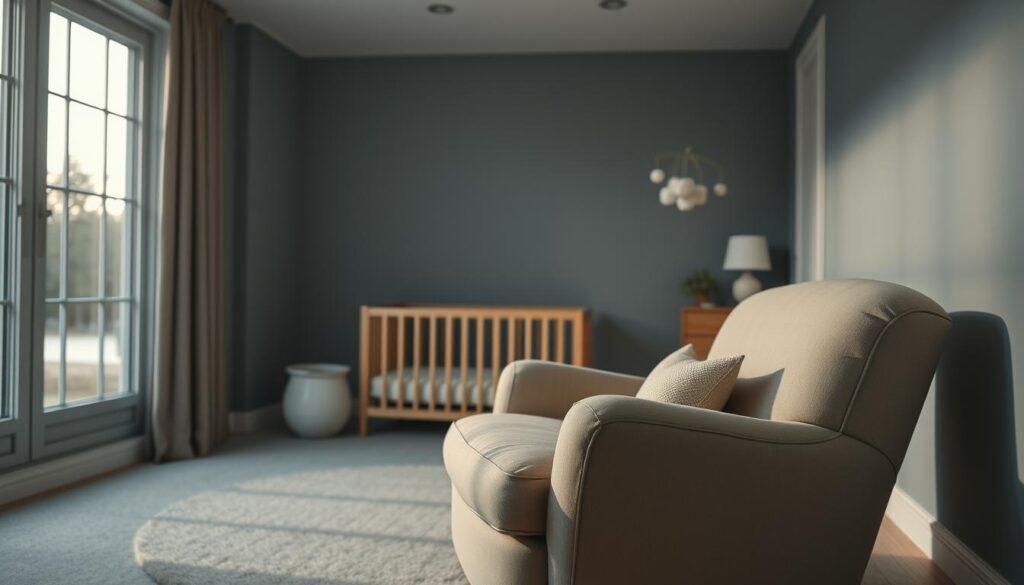
Effective Noise Control Strategies for Parents
Creating a peaceful environment for your baby during noisy events is very important. Parents can use different noise control strategies to keep things calm. Using soundproofing techniques and white noise can make sleep better and less disturbed.
Utilizing Soundproofing Techniques in Your Home
Reducing unwanted noise can be achieved by soundproofing your home. Here are some ways to do it:
- Heavy Curtains: Thick curtains can soak up sound and keep outside noise away.
- Carpeting: Soft carpets are not only comfortable but also reduce echoing sounds.
- Insulation: Good insulation in walls and ceilings keeps sounds from moving between rooms.
- Weatherstripping: Filling gaps around doors and windows stops outside noise from getting in.
Using White Noise Machines for Better Sleep
White noise machines are great for managing noise. They create a steady sound that covers up jarring noises, helping your baby relax and sleep better. When choosing a machine, think about these points:
- Sound Variety: Choose machines with different sound options, like lullabies or nature sounds.
- Volume Control: Make sure the volume can be adjusted to comfort your baby.
- Timer Features: Some machines have a timer so they turn off automatically, saving energy.
Baby-Friendly Party Noise Tips
Planning a party with a baby means you have to think ahead. It’s key to make it fun for adults and safe for babies. Picking the right time for your event helps a lot. The best time can keep your baby happy and handle noise better.
Choosing the Right Time for Social Gatherings
When you plan a party, keep timing in mind. Host your event when your baby is usually awake. This can cut down on sleep disruptions and make things more comfy for everyone. The early afternoon is a great choice. Babies are often more awake and happy then. They can join in on the fun without getting too tired or overwhelmed.
Setting Reasonable Noise Levels for Events
Keeping the noise down at your party is good for your baby and guests. Ask people to talk quietly and play music softly. Consider using a sound level meter app to check the noise. This makes sure the party is enjoyable for everyone. Thinking about the noise level will keep your baby calm and everyone happy.
Managing Noise Levels with Babies at Events
Having baby-friendly parties calls for special care, especially in controlling noise. To make a comfy space for your baby, use strategies that keep things quiet and make guests feel involved. Here are some great tips for a great party.
Strategies for Hosting Baby-Friendly Gatherings
Creating quiet zones is a smart way to handle noise. Ask guests to chat or do quiet activities in these areas. Also, plan your party when the baby is awake so they can join in. This helps prevent the baby from getting upset by loud sounds.
Engaging Guests in Quiet Activities
Offer quiet games and activities to keep the noise down and the fun up. You could have board games, crafts, or story time. These help everyone have a good time while staying calm. Making sure your party is both fun and peaceful is crucial, so everyone, including the baby, enjoys it.
Quiet Party Alternatives for Parents with Babies
Finding fun gatherings for parents with babies is key. Quiet party alternatives offer a great time while keeping stress low. They are perfect for creating a calm setting that promotes friendly chats without too much noise.
Low-Key Gathering Ideas
Choosing low-key gatherings helps babies feel at ease. Some great ideas are:
- Potluck dinners where guests bring their favorite quiet dishes.
- Book club meetings focused on literature discussions in a cozy setting.
- Craft nights that allow for conversation while participating in a shared activity.
- Movie nights showcasing family-friendly films in a calm space.
- Picnic brunches at a quiet park nearby.
Outdoor Events: Pros and Cons
Outdoor events offer pros and cons for families. Knowing these can help you decide what’s best:
| Pros | Cons |
|---|---|
| Plenty of space for babies to move around safely. | Potential noise from external sources such as traffic or other events. |
| Natural light and fresh air make for a pleasant atmosphere. | Weather conditions can be unpredictable and may affect comfort. |
| Great chances for kids to explore nature. | It may take extra effort to find a quiet spot. |
| Usually offers flexible timing and activities. | Outdoor places might get crowded, causing overstimulation. |
Creating a Calm Environment During Parties
Creating a peaceful setting at parties is key for your baby’s happiness and well-being. This is very true in lively, noisy settings. Keeping a baby’s routine steady is crucial. It makes them feel safe and secure. Adjusting your gatherings to fit these routines makes babies feel at ease.
Importance of Routine for Babies
Babies need a regular schedule to handle their day. Disruptions from parties might upset them. Keeping set times for feedings and naps creates a better, happier setting. Making sure guests know the importance of these routines helps everyone have a good time.
How to Recognize When Your Baby Needs Quiet Time
It’s important to notice when your baby needs a break during events. Signs like yawning and fussiness mean they need quiet. Having a special quiet area for them at gatherings helps a lot. Paying attention to these signs ensures your baby stays happy.
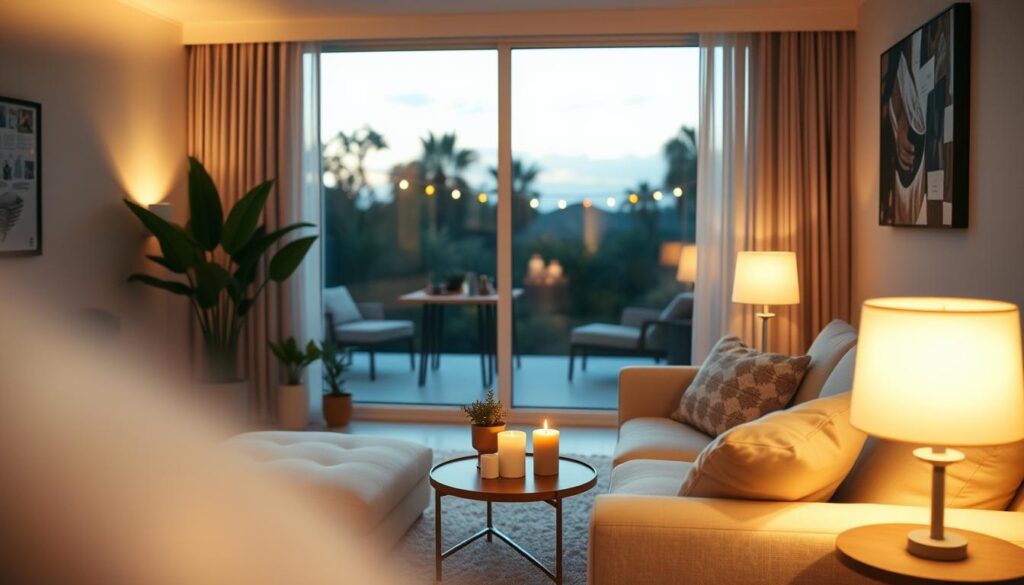
Emergency Measures for Excessive Party Noise
If party noise gets too loud, it’s crucial to act fast to protect your baby’s well-being. Deciding whether to talk to neighbors or call the cops is key. Knowing how to handle loud party sounds will keep things peaceful. Plus, using tech like noise apps can really help control the noise at parties.
When to Engage Neighbors or Call Authorities
Talking to neighbors about loud party noise should be your first step. If the noise is too much, tell your neighbors how it’s affecting you. Begin with a friendly chat because they might not know they’re being loud. If things don’t get better or the loud parties keep happening, it might be time to call the police. Knowing the local noise rules will tell you when it’s right to do this.
Tech Solutions: Apps to Monitor Noise Levels
There are many apps out there to help parents monitor party noise. These apps give you updates on noise levels, so you know if it’s getting too loud for your baby. Some good ones are Decibel X and Sound Meter. With these apps, you can keep your baby’s environment peaceful and step in if the party gets too loud. By using tech, you can tackle loud noise problems quickly, making sure your baby stays safe and comfy.
Understanding Party Noise Etiquette
When you have a party, it’s key to think about noise, especially if you have babies at home. Keeping the noise in check helps your guests feel welcome and makes sure your baby sleeps well. Talking to your guests about how loud they should be can help everyone get along.
Communicating Expectations to Guests
Before your party starts, make sure to tell your guests what you expect. This way, they’ll know how important it is to not be too loud. You could send a message explaining:
- The best time for quiet activities.
- Places where noise should be low.
- Ideas for calm games or chats.
Respecting Baby Sleep Times During Gatherings
Knowing when your baby needs quiet is important for keeping the peace. Tell your guests about your baby’s sleep times. This helps them know when to quiet down or move. Set up quiet spots for guests to talk without waking your baby. Following these steps makes sure your baby sleeps well and everyone enjoys the party.
Finding Balance Between Social Life and Parenting
Having a baby doesn’t mean you have to miss out on fun events. Finding a way to enjoy these events while keeping your baby comfortable is key. Knowing when your baby needs fun or quiet time is important.
Strategies for Parents to Attend Events Responsibly
To keep your social life and be a good parent, planning is crucial. Here are some ways to make sure both you and your baby have a good time:
- Choose appropriate venues with quieter settings.
- Arrange for childcare during particularly stimulating events.
- Coordinate with friends to have a baby-friendly atmosphere.
- Limit your time at loud gatherings to avoid overwhelming your baby.
Balancing Stimulation and Calmness for Your Baby
It’s important to know what your baby needs. Follow these tips to keep a good balance:
- Observe your baby’s cues to determine their comfort level.
- Prepare a calm space away from noise for breaks if needed.
- Engage with guests in smaller groups to prevent overstimulation.
- Introduce soothing elements, such as soft music or lullabies, to help manage noise levels.
Personalizing Your Approach to Managing Noise
Effective noise management for your baby needs a unique approach. Tailoring noise strategies helps create the best environment for your child. Each baby reacts differently to sounds.
It’s critical to watch how they respond to sounds. This helps you change tactics to make sure your baby is comfortable and safe at social gatherings.
Tailoring Strategies Based on Your Baby’s Temperament
Each baby acts differently around noise. Some love busy places, while others don’t like them much. You can figure out the best methods for your baby by trying different strategies.
If loud sounds bother your baby, using noise-canceling methods can help. Or, plan some quiet time in another room during parties. Watching your baby closely helps you tweak your plan as needed.
Open Communication with Your Partner on Noise Management
Talking with your partner is key in managing noise. Sharing what you’ve noticed and what works helps keep things consistent. Make sure you both agree on how loud things can get and what to do if your baby seems upset.
Effective communication helps smooth over any differences. It also makes sure you both work together to keep your baby calm.
Conclusion
Managing party noise is key to keeping your baby comfortable during get-togethers. This article explains how a peaceful setting helps your baby sleep better and stay happy. By planning and limiting noise, you make parties enjoyable for your little one.
Using strategies like setting noise limits and creating quiet areas can improve your baby’s comfort. This doesn’t mean you can’t have fun. It’s about making sure both you and your baby are happy.
Remember these tips when you host a party with your baby. They’ll help make your get-togethers fun for everyone, including your little guest. With these strategies, you can make your home a great place for gatherings without upsetting your baby.

